Graduate Student Creates New Arrangements for Unpublished Johnny Mercer Songs
As part of the Rialto Series, The Georgia State University Library will be hosting a Johnny Mercer Tribute Concert on Friday, February 7, 2020 at 8:00 pm at the Rialto Center for the Arts in downtown Atlanta. South African trumpet player Marco Maritz, who over the past few semesters has been working as a Graduate Research Assistant in the Georgia State University Library Special Collections and Archives, has crafted new arrangements for some of Mercer’s unpublished songs. These song ideas exist in the archives as anything from arranger’s lead sheets to undated draft lyrics and musical notation on scraps of note paper and are now being heard by the public for the first time. The vivacious Maritz, who has been known to burst into GSU’s archives early the morning after a late night of playing with local jazz ensembles, shared some insight into working in the Mercer archives to create these new arrangements.
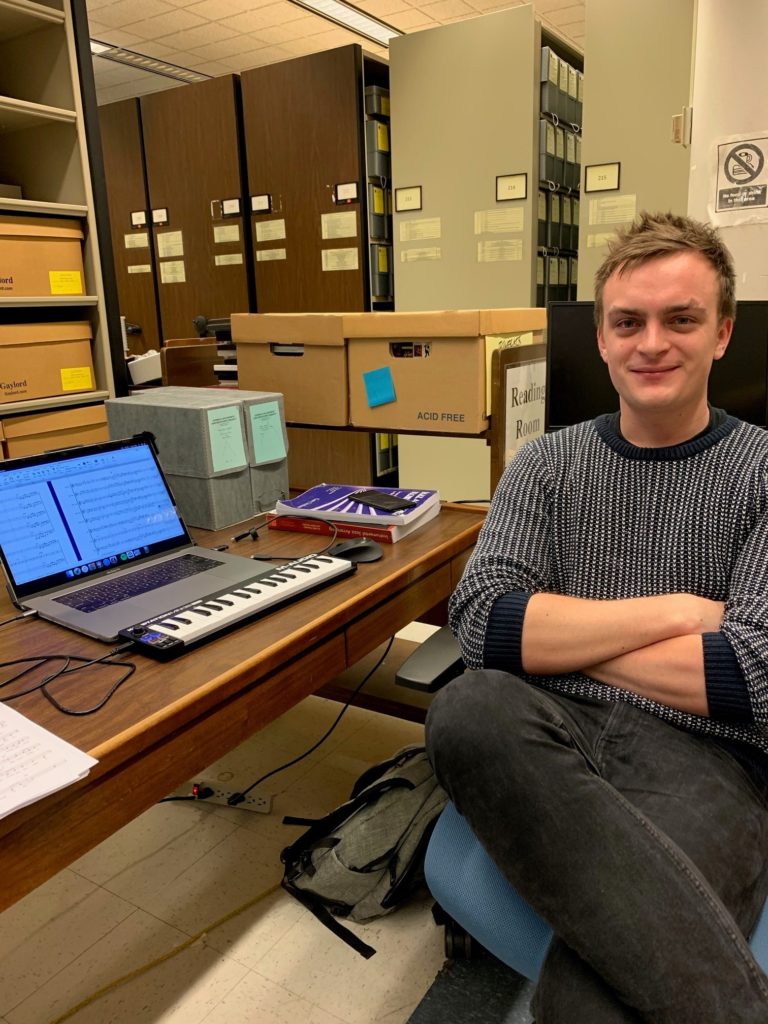
What did you know about Johnny Mercer going into this project?
Maritz: Initially, Kevin (Fleming, GSU’s Popular Music and Culture Archivist) introduced me to Johnny Mercer, I didn’t know who he was at the time. Later on I discovered he was quite a phenomenal vocalist and songwriter and really had an amazing career. This was pop music, it was like the Beyoncé of that day. It resonated with the people of that time period, that’s why [Mercer] did so much commissioned work and was writing so much, because it was in demand. I think he knew exactly what the people wanted to hear. I tried to find things that resonated with me in the songs I selected for this concert.
Song 1: Be Happy
Maritz: The melody reminded me of the song ‘Bare Necessities’ (laughs), and the lyrics sound very similar to something that Dr. Seuss might have written. For this song the lyrics weren’t complete. For the B section, I had to work out how to let it flow more smoothly and also the melodies… I had an idea of what to go off of but I altered it a little bit and added my own chords to this arrangement.
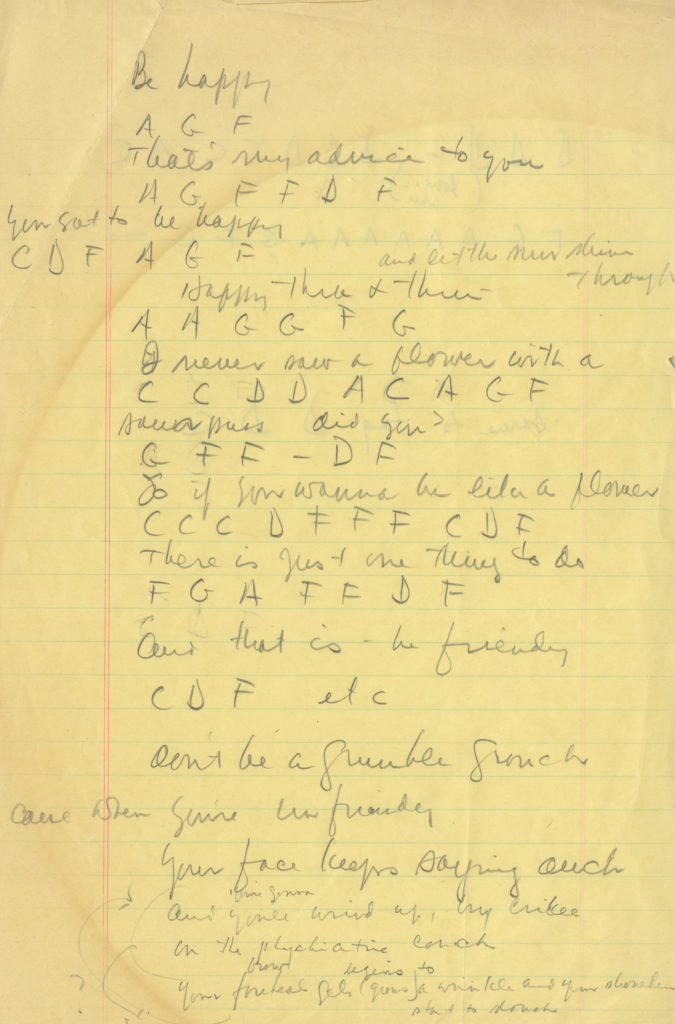
Mercer’s Draft Lyrics for “Be Happy” 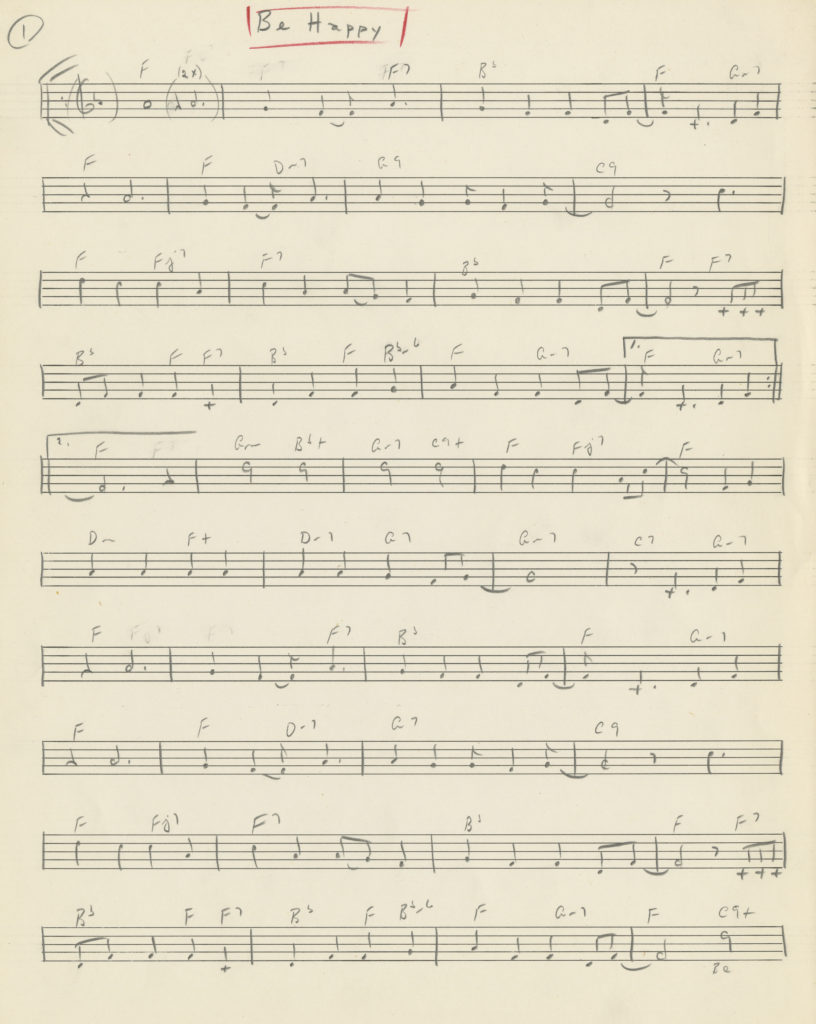
Mercer’s Lead Sheet for “Be Happy”
How do you write lyrics like Johnny Mercer?
Maritz: I altered lyrics to see what would work the best. On the original sheet there was an idea, a few options from which to choose… there were a couple of different alternative lyrics I could have used from the B sections but it didn’t fit very well. Kevin also helped to see what would work to smooth it out.
Fleming: We looked at other songs in The Complete Lyrics of Johnny Mercer book that dealt with being happy. The main thing was to fit the music. It’s not necessarily writing new lyrics, it’s just kind of modifying a bit. I look at it as Mercer might have done the same thing once he got to the stage of applying the music to the lyrics, so I don’t see it being too far fetched from what Mercer might have done.
Maritz: Like the B section, there’s a part where it says, ‘Don’t be a grumble grouch/ because your shoulders will slouch/ and you’ll end up in a psychiatric couch.” In that sentence alone you can see there’s a lot of flow-iness. To put it into a musical context, the B section in jazz is usually between six and eight bars and what was there didn’t really fit, so we spent time to see how we could make it work and we changed little things. I think that’s probably why it wasn’t published. The A section was perfect, it’s really smooth, the B section was the hard part. What I decided to do on the arrangement specifically, I wanted the band to be a part of this journey… this song is a very positive song, it’s about being happy. We’re going to end the concert with this song to send that message out. I decided to use some techniques to let the band sing, like in the old days band members, usually horn players, sing naturally with the band, these call and response figures, but in big band you don’t see it too often. So there’s an interaction of the band itself and the audience. This is also a duet song. The two artists Joe [Gransden] and Tierney [Sutton] will play off each other by alternating the melody.
Song 2: You Knock Me Out
Maritz: With this one, I just liked the melody, it was very cheesy. Jazz songs always end up being love songs or sad songs, but I thought it would be nice to put in a cheesy one. For this one I altered the melody and wrote a big sax solo, which was my biggest joy. It kind of reminds me of Count Basie’s version of “All of Me”… where the sax’s are really playing laid back, so I thought let me put something like that into context with this piece. I like that big vibrato sound you can get out of the sax and I thought with this tempo… it’s one of the oldest tricks in the book that will work just fine.
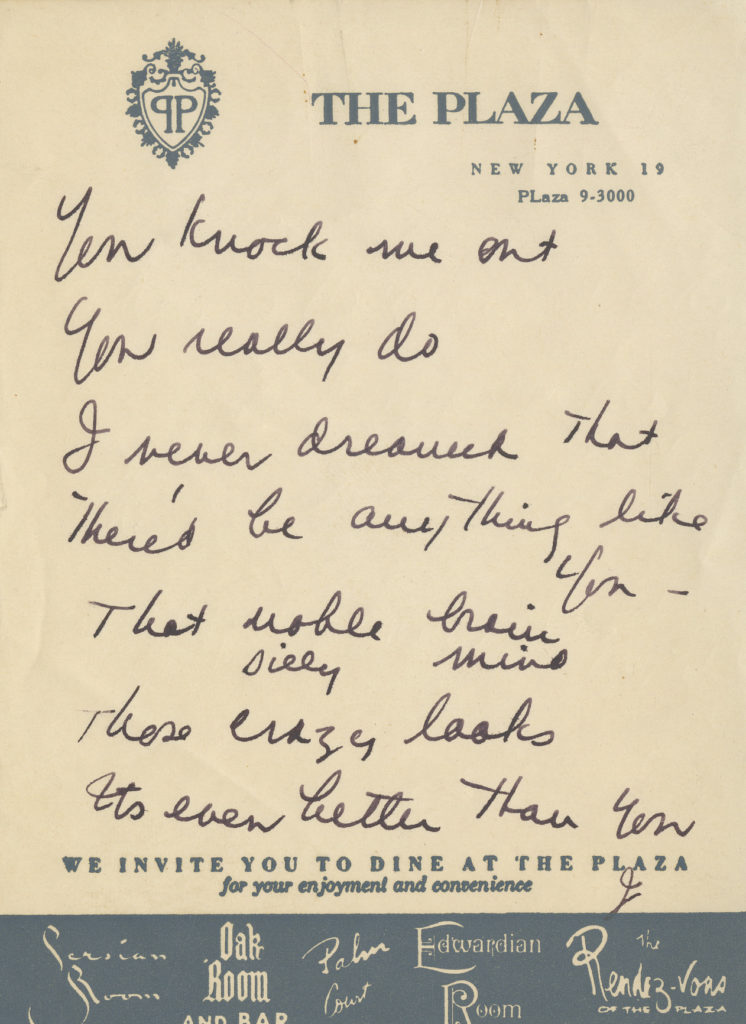
Mercer’s Lyrics for “You Knock Me Out” 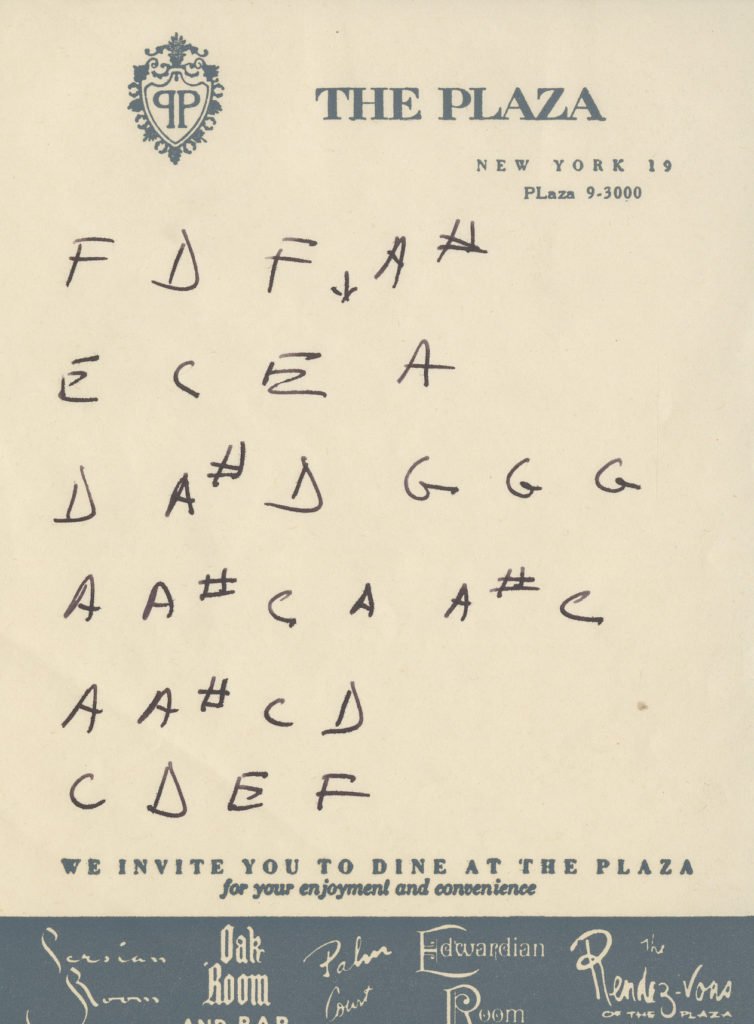
Mercer’s Melody for “You Knock Me Out”
Song 3: Fate Moves in Mysterious Ways
Maritz: This was already published but not arranged for big band. This is the only one I have a recording of him singing it. I decided it to turn into a ballad for Tierney Sutton. The lyrics on this one “Fate moves in mysterious ways/ its wonders to perform/ fate chooses its oddest of days/ to turn from cold to warm.” It has a nice flow, the ballad will fit into the concert quite nicely. The only thing I did that was different, I added a section where the sax’s give a statement and then the melody goes over to the trumpets and trombones. This is a more modern arrangement than the old school style.
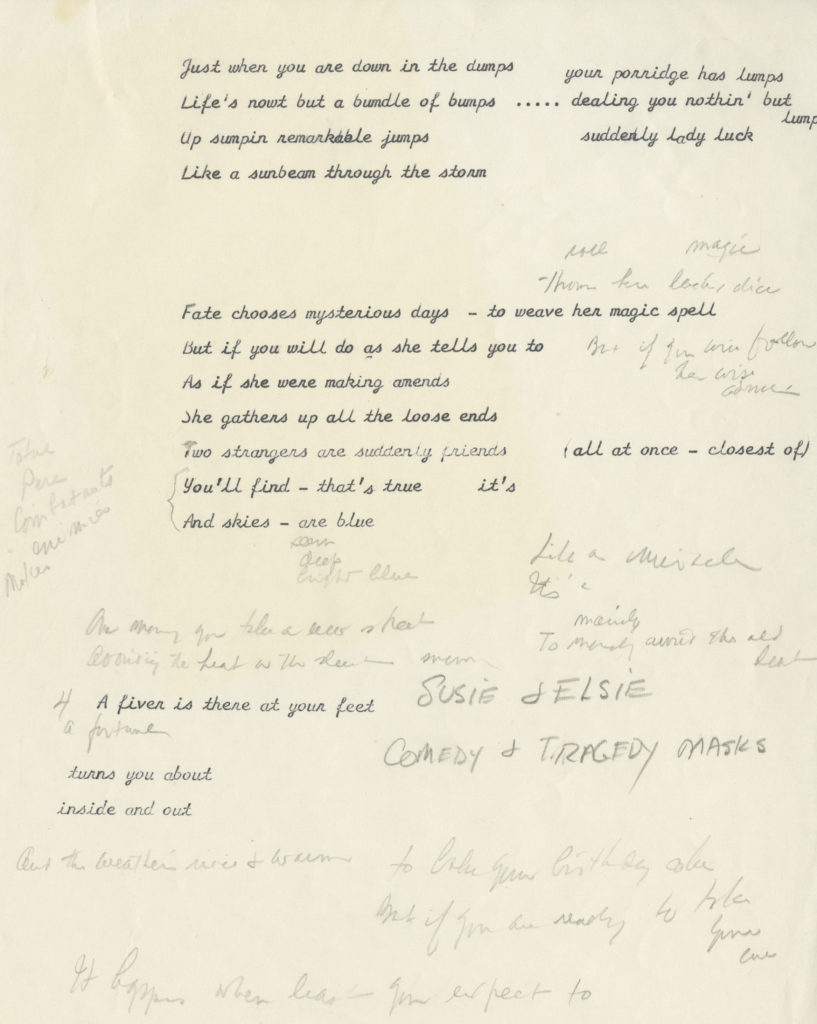
Mercer’s Draft Lyrics for “Fate Moves in Mysterious Ways” 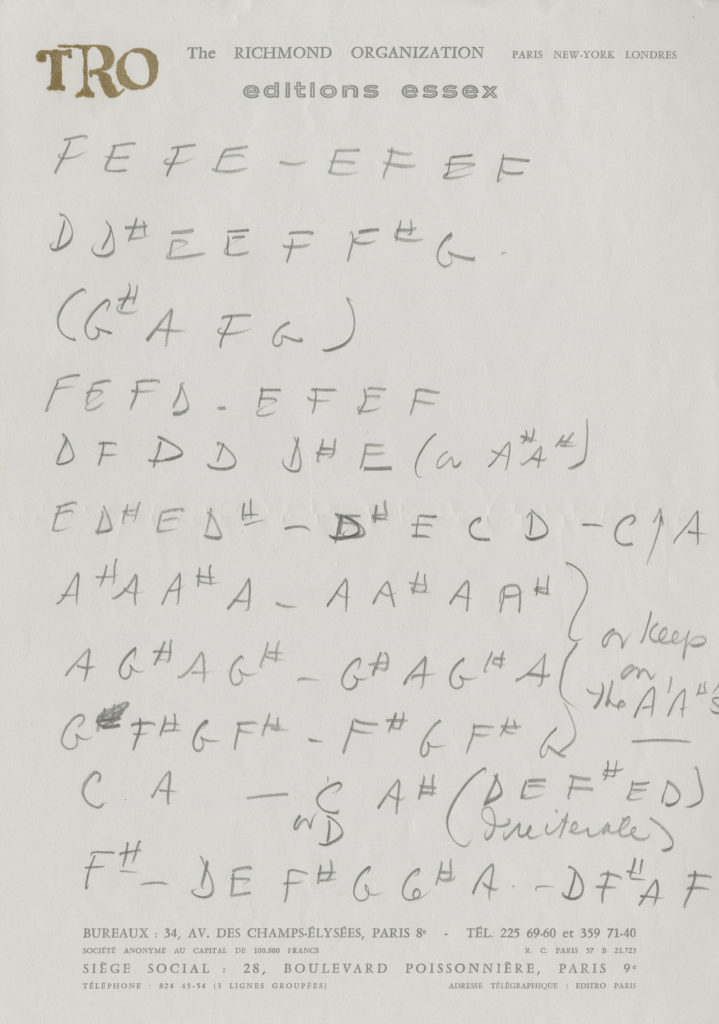
Mercer’s Melody for “Fate Moves in Mysterious Ways”
How did working in the archives affect your arrangements?
Maritz: This project has taught me so much more than arranging things, it taught me to focus on the artist specifically and see his creativity level over his time period and to put it into my own writing style. I’ve learned so much… I think my perspective has changed a lot. I would have never imagined I’d be here two years ago. I’m very thankful to the Johnny Mercer Foundation for giving this platform to students to explore and having the freedom to do so.